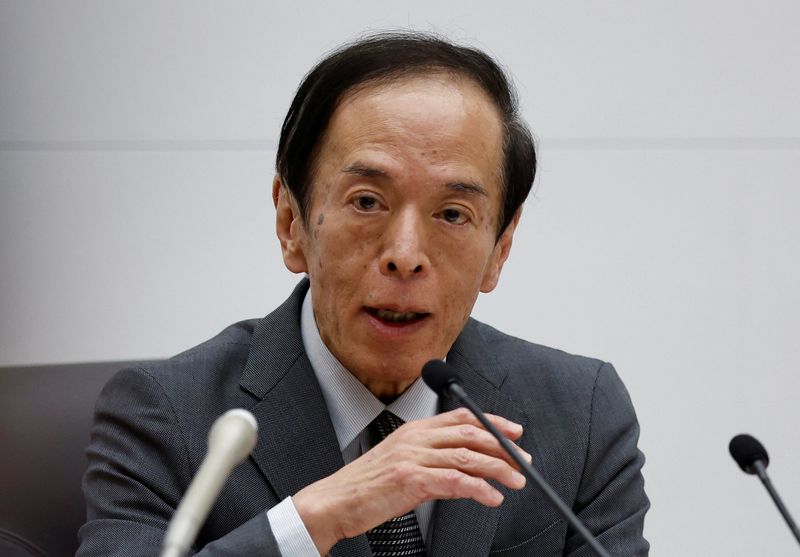By Leika Kihara
TOKYO (Reuters) -Bank of Japan (BOJ) Governor Kazuo Ueda said the central bank is unwavering in its stance of patiently maintaining ultra-loose monetary policy, reassuring markets Japan will be a dovish outlier as its global peers combat stubbornly high inflation.
The recent rise in Japanese inflation above the BOJ's 2% target is driven mostly by cost-push factors rather than strong domestic demand, Ueda said, adding that responding to such price increases with tighter monetary policy would hurt the economy.
There was also a risk of overseas growth undershooting expectations due to the fallout from aggressive U.S. interest rate hikes, Ueda said on Friday.
"At present, it's necessary to continue with monetary easing," as Japan has yet to see conditions fall in place for inflation to sustainably hit 2%, he told a seminar.
While this year's domestic wage negotiations led to pay hikes unseen in three decades, the BOJ must wait and see whether such wage increases will broaden to more companies and become durable, he said.
"The cost of prematurely shifting policy, and nipping the bud towards achieving 2% inflation, is extremely large," Ueda said. "It's appropriate to take time judging (when to) tweak ultra-easy policy toward a future exit."
Ueda offered few clues on how soon the BOJ could contemplate a policy tweak.
"The timing may arrive earlier than expected or later", depending on how economic uncertainties play out, he said, when asked about the chance of inflation sustainably hitting 2% by the end of this year.
NO CHANGE TO 2% TARGET
The remarks came in the wake of data showing Japan's core consumer inflation hit 3.4% in April, staying well above the BOJ's 2% target, on rising food and services prices.
The dovish tone may scale back market expectations that Ueda will soon start to phase out his predecessor's stimulus to address the mounting side effects of prolonged easing, such as distortions that its huge bond buying are causing in market pricing.
Instead of focusing only on the side effects, the BOJ must carefully weigh the balance between the benefits and costs of its measures in determining policy, Ueda said.
A Reuters poll taken April 12-19 showed over half of economists predicted an end to the BOJ's yield curve control by year-end.[ECILT/JP]
In his first speech since taking the helm in April, Ueda said he would strive to "make logical decisions and provide explanations as clearly as possible" to maximise the impact of monetary policy by affecting markets and public behaviour.
He added that his plan to conduct a year-long policy review is aimed at analysing the effects and costs of various steps the BOJ had taken to combat deflation.
But the review won't be conducted on the assumption of modifying the BOJ's 2% inflation target, he said.

"I don't see the need to review the price target," Ueda said, countering the view held by some academics that the BOJ should water down the goal to give itself more flexibility in raising interest rates from ultra-low levels.
Under yield curve control (YCC), the BOJ sets a -0.1% target for short-term interest rates and a 0% cap for the 10-year bond yield to sustainably hit its 2% inflation target. It also buys huge sums of government bonds and risky assets to pump money into the economy.